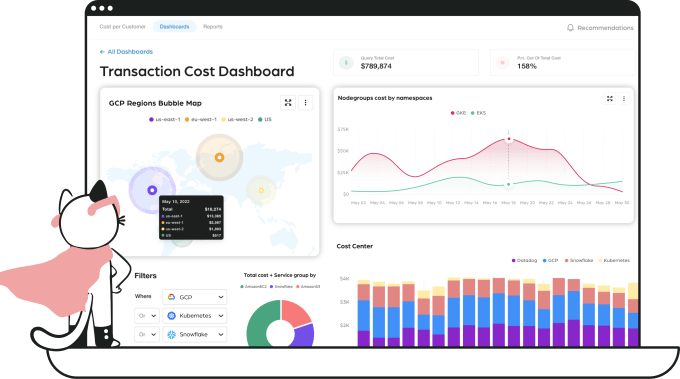
In 2021, Roi Ravhon, Asaf Liveanu and Yizhar Gilboa came together to found Finout, an enterprise-focused toolset to help manage and optimize cloud costs. (We covered the company’s launch out of stealth in 2022.) Ravhon, Finout’s CEO and previously the director of engineering at observability platform Logz.io, says that he was spurred to start Finout by the roadblocks he personally encountered in trying to make sense of cloud costs.
“One of the main challenges enterprise faces is wide cloud cost management tool adoption, which is first and foremost organizational change,” Ravhon told TechCrunch. “AI has the potential to have huge cost implications, attributed to either a third party or driving up the regular cloud cost of infrastructure used for AI purposes.”
Indeed, companies are plunking down a small mountain of cash for cloud products and services amidst the AI boom. At the same time, they’re struggling to get insights into those costs — and to get costs under control.
According to a report from Canalys, worldwide spending on cloud infrastructure services alone grew 21% year-over-year in Q1 2024 to reach $79.8 billion, a $13.4 billion uptick. Yet two-thirds of companies can’t accurately report their cloud unit costs, while 58% say their costs are too high, per a CloudZero poll.
So how does Finout solve for this? By integrating with the clouds and services a company is already using — including from big incumbent vendors like Amazon Web Services, Google Cloud, Microsoft Azure and so on — to provide a comprehensive view of spending. Beyond analytics dashboards, Finout hosts tools to reallocate and adjust cloud spend across departments, teams and individual projects, presenting options that a company might not have arrived at on its own.
“For a C-suite IT manager, Finout’s technology provides comprehensive visibility into cloud spending, helping IT leaders identify inefficiencies and optimize resources effectively,” Ravhon said. “The advanced cost allocation features ensure the precise distribution of cloud expenses across departments, supporting better budget management and accountability.”

Finout’s rivals in the sector for cloud spend management tools, also known as FinOps, include Broadcom-owned CloudHealth and IBM’s Cloudability as well as startups like Vantage, Exostellar and Ternary. Finout has attracted high-profile customers like The New York Times, Tenable and Wiz in spite of this crowded market, and grown annual recurring revenue ninefold from 2022 to 2023.
To set the stage for further growth, Finout this week closed a $26 million Series B round led by Red Dot Capital with participation from Maor Investments, Team8, Pitango and Jibe Ventures. Bringing Finout’s total raised to $45 million, the cash will be put toward growing Finout’s team from 45 people to 75 by the end of the year with a focus on the R&D, go-to-market and customer success teams.
“The slowdown in tech has led many companies to focus on optimizing their unit economics, with cloud spending being a significant factor,” Ravhon said. “As organizations seek to improve their financial efficiency, Finout thrives.”





